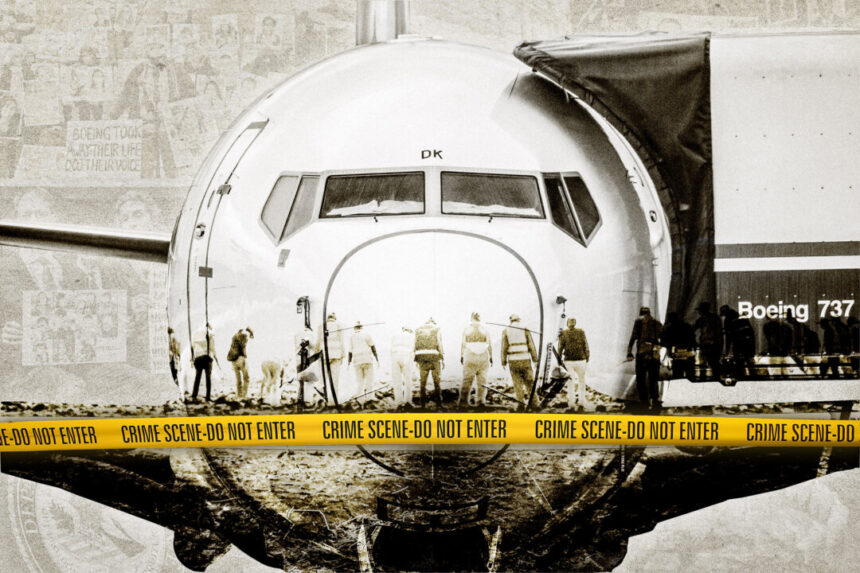Boeing’s fortunes took a turn for the worse when a door panel ripped off an Alaskan Airlines flight after takeoff on Jan. 5.
If the incident had not occurred, Boeing would have avoided criminal prosecution by the Department of Justice (DOJ) by just two more days.
However, the incident led to federal investigations, congressional hearings, and renewed public scrutiny of Boeing due to the 737 MAX 8 crashes in 2018 and 2019, resulting in criminal charges against the company.
As a result of the fallout, Boeing reported a $355 million loss, a nearly 50 percent drop in deliveries in the first quarter, plummeting stock values, and canceled orders from multiple airlines.
The DOJ plans to meet with crash victims’ families on May 31 before announcing its decision on Boeing’s case by July 7.
Experts and attorneys interviewed by The Epoch Times discussed how Boeing’s actions violated the agreement and the potential consequences.
What Triggered the DOJ Investigation?
Boeing’s decision to release an upgraded version of its 737 jet, the 737 MAX, with new flight control software called MCAS, led to the investigation.
The MCAS system, faulty angle of attack indicators, and Boeing’s failure to disclose crucial information about the software contributed to the fatal crashes of the 737 MAX 8 planes in 2018 and 2019.
Boeing’s lack of transparency and delayed response to address the software issues led to a grounding of all 737 MAX jets by the FAA for nearly two years.
Experts believe the accidents were preventable if Boeing had disclosed the software details, but the company prioritized sales over safety.
The investigations by the DOJ, FAA, and House Transportation Committee highlighted Boeing’s misconduct and negligence in handling the 737 MAX situation.
How Was Boeing Charged?
The DOJ charged Boeing on Jan. 7, 2021, with conspiracy to defraud the United States, specifically the FAA’s Aircraft Evaluation Group.
Boeing was accused of withholding critical information about the MCAS system from regulators and airlines, leading to the fatal crashes.
Despite the settlement, Boeing had to comply with certain conditions, including implementing a compliance and ethics program to prevent future violations.
Boeing’s probationary period was about to end when the incident with Alaskan Airlines occurred.
Alleged Violation
The DOJ’s letter on May 14 accused Boeing of failing to establish a proper compliance and ethics program as required under the settlement.
The agency did not explicitly state whether the Alaskan Airlines incident or any others from 2024 were linked to Boeing’s lack of a compliance and ethics program.
Robert Clifford, lead attorney for the families of the 2018 and 2019 crash victims, mentioned that the DOJ hasn’t informed him or the families about the acts or incidents that led to Boeing’s breach of the agreement. He expressed hope to learn details of the investigation and government plans moving forward.
The DOJ also indicated in the letter that it reserves the right to find Boeing in violation of other terms of the agreement until July 7, when it will announce how the agency intends to proceed with the case.
Possible criminal charges could be pursued by the DOJ against Boeing. Neama Rahmani, a former federal prosecutor, suggested that the DOJ could issue a massive fine, appoint an independent monitor, or prosecute individuals in the company such as CEO Dave Calhoun. Robert Clifford mentioned that fines, criminal charges against Boeing, an appointment of an independent monitor, a new deferred prosecution agreement, and further negotiations are likely options for the agency.
Richard Levy, a commercial pilot and aviation consultant, anticipates that Boeing will argue that it has implemented changes to address concerns and expects another probationary settlement agreement. He does not foresee individuals at Boeing facing criminal charges unless intentional fraud is proven during the settlement agreement period.
The DOJ did not respond to a request for comment.
Mr. Clifford is hesitant to speculate on the DOJ’s actions but expects the prosecution of Boeing to continue and a public trial date to be set. Boeing has until June 13 to respond to its breach of the deferred prosecution agreement and explain the nature and circumstances of the breach.
Paul Cassell, a law professor, is not confident that the government will find Boeing in violation of the settlement or expect criminal prosecution from it. Mr. Rahmani believes that the government’s announcement will be welcomed by Boeing victims and lawyers.
Some aviation experts note that the case is uncharted territory for the United States. Michael Boyd, president of an aviation consulting firm, mentioned that the government could fine Boeing or charge a few individuals due to its status as a major aerospace and defense contractor. He predicted that Boeing as a company would distance itself from individuals facing charges.
Source link







